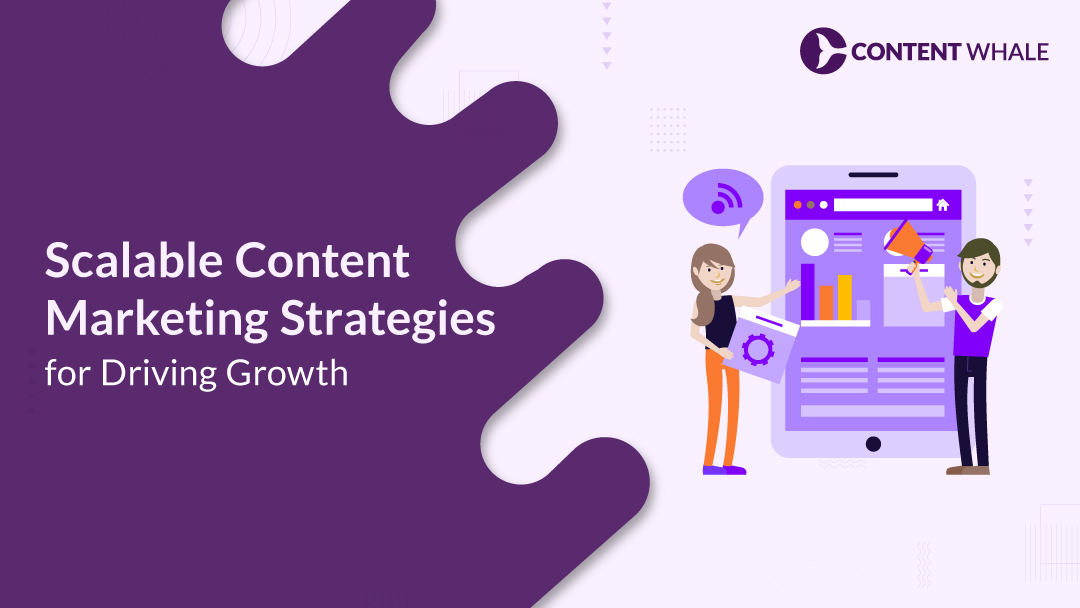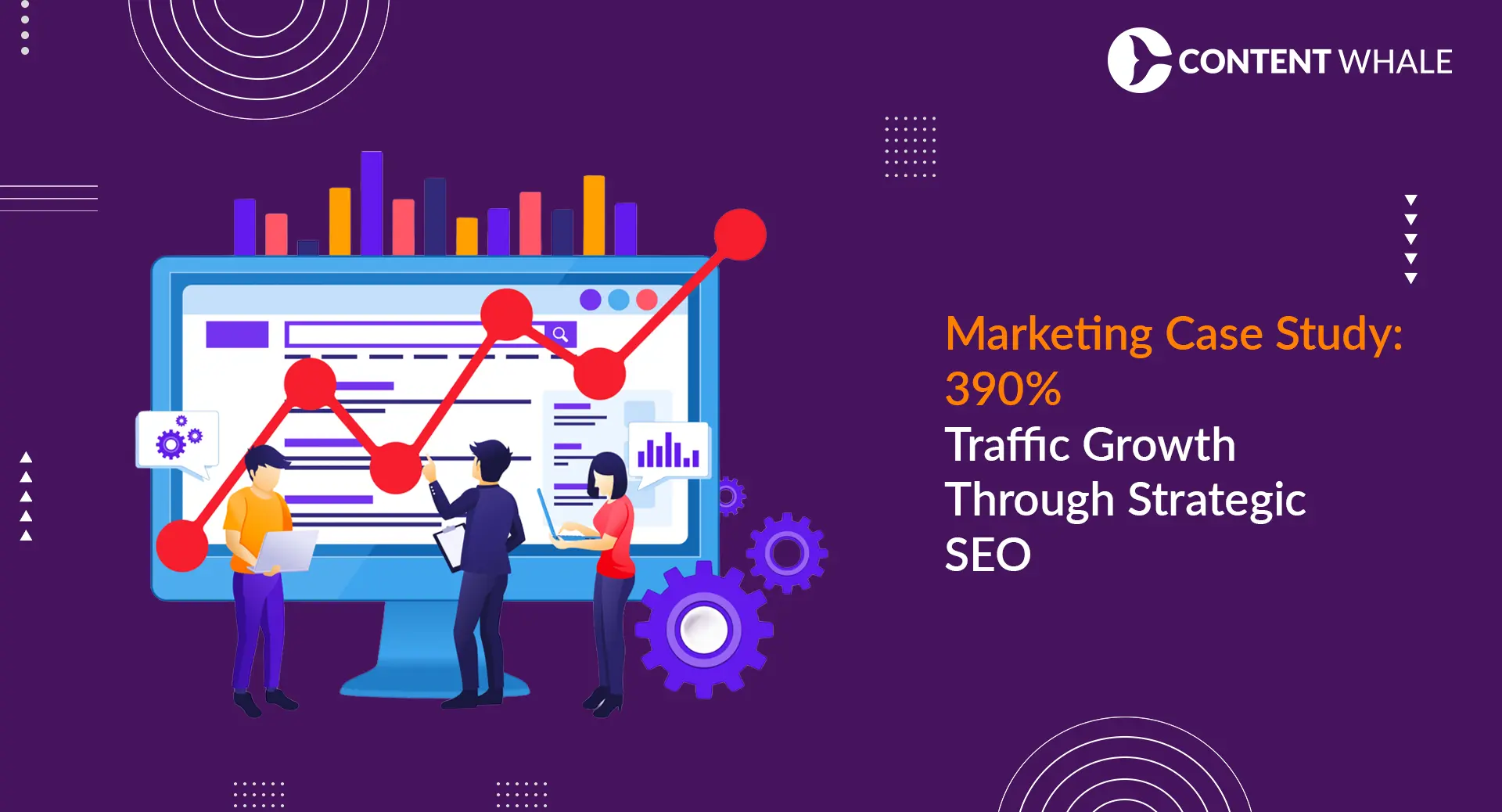Quick Summary
Scalable content marketing is essential for business growth, ensuring consistent quality while increasing content production. It involves strategic planning, creation, distribution, and repurposing of content. Developing and implementing a scalable content strategy leads to sustainable digital growth, enabling businesses to meet rising content demands without compromising quality. Key benefits include enhanced brand visibility, improved search engine rankings, and better audience engagement, driving overall digital marketing success.
Scalable content marketing is a critical aspect of modern digital marketing strategies. It refers to the ability to produce and distribute high-quality content consistently and efficiently as your business grows. In today’s competitive digital environment, implementing scalable content strategies is essential for achieving sustainable growth.
Growth strategies in content marketing involve creating content that can be easily scaled without compromising quality. This includes developing evergreen content, repurposing existing materials, and leveraging automation tools to streamline processes. Effective scalable content marketing helps businesses meet the increasing demand for fresh, engaging content, thus enhancing their digital presence and driving growth.
Digital marketing and scalable content are deeply interconnected. A well-executed scalable content strategy not only supports SEO efforts but also boosts brand visibility and customer engagement. In this blog, we will explore the key components of scalable content marketing, the steps to develop and implement such strategies, and the significant benefits it offers for digital growth.
By focusing on scalable content marketing, businesses can ensure consistent content quality, maintain brand integrity, and effectively reach a wider audience, ultimately driving sustainable growth and success in the digital space.
Understanding Scalable Content Marketing

Scalable content marketing is a strategy that enables businesses to produce and distribute high-quality content efficiently, meeting increasing demands without sacrificing quality. This is essential for expanding a business’s digital presence and engaging a larger audience.
Definition and Explanation
Scalable content marketing involves creating systems that allow for the easy production, modification, and distribution of content. This approach maximizes reach and impact without significantly increasing resources. For instance, evergreen content like guides and tutorials remains valuable over time and can be repurposed into various formats, such as videos and infographics.
Importance for Business Growth
Scalability is crucial because it allows businesses to grow without compromising content quality. Key benefits include:
- Efficiency: Streamlined processes reduce the time and effort needed for content creation, allowing teams to focus on strategy.
- Consistency: Maintaining consistent content quality helps build brand trust and authority.
- Reach and Engagement: Scalable content can be distributed across multiple platforms, increasing engagement and driving more traffic.
Examples of Scalable Content Types
- Evergreen Content: Long-lasting pieces like how-to guides that continually attract traffic and can be repurposed into different formats.
- Templates: Frameworks for common content types, such as blog posts and emails, ensure consistency and save time.
- Repurposable Content: Content designed for multiple uses, like breaking down a blog post into social media updates and video scripts.
Focusing on these content types helps businesses support their growth strategies and enhances overall digital marketing efforts.
Key Components of Scalable Content Strategies

Effective scalable content marketing requires a strategic approach that includes detailed planning, creation, distribution, and repurposing of content. Here’s a breakdown of these key components:
1. Content Planning
Planning is the foundation of any successful content marketing strategy. A well-defined content plan ensures that your content efforts align with your business goals and audience needs. Key aspects of content planning include:
- Audience Research: Understand your target audience through surveys, analytics, and customer feedback.
- Content Goals: Establish clear, measurable objectives like increasing website traffic, generating leads, or improving brand awareness.
2. Content Creation
Creating high-quality, scalable content involves several key practices:
- Templates: Use templates for blogs, social media posts, and emails to maintain consistency and streamline the creation process.
- Evergreen Content: Focus on creating long-lasting content that remains relevant over time, such as guides and tutorials.
- Repurposing: Develop content with repurposing in mind. For example, a blog post can be turned into social media updates, infographics, and video scripts.
3. Content Distribution
Effective distribution ensures your content reaches the widest possible audience:
- Multi-Channel Strategy: Share your content across various platforms, including social media, email, and your website.
- SEO Optimization: Optimize your content for search engines to improve visibility and attract organic traffic.
4. Content Repurposing
Repurposing extends the life and reach of your content:
- Update Existing Content: Regularly update and optimize older content to keep it relevant.
- Different Formats: Convert blog posts into videos, podcasts, and infographics to reach different audience segments.
Focusing on these components helps businesses implement growth strategies that enhance their digital marketing efforts, driving sustainable growth and improved engagement.
Steps to Develop and Implement Scalable Content

| Step | Description | Key Activities | Tools and Resources |
|---|---|---|---|
| 1. Conduct Audience Research | Gather insights about your target audience’s demographics, preferences, and content consumption habits. | Surveys, analytics, social media insights, customer feedback | Google Analytics, SurveyMonkey, social media analytics tools |
| 2. Set Clear Goals | Define specific, measurable, achievable, relevant, and time-bound objectives for your content strategy. | Identify business objectives, set SMART goals | Internal meetings, business intelligence tools |
| 3. Create a Content Calendar | Plan and schedule content to ensure consistent production and distribution. | Outline content topics, assign roles, set deadlines | Google Sheets, Trello, Asana |
| 4. Leverage Automation Tools | Use tools to streamline content creation, distribution, and analysis. | Implement CMS, schedule social media posts, automate emails | WordPress, Hootsuite, Mailchimp |
| 5. Measure and Optimize | Regularly review content performance and adjust strategies based on data. | Track key metrics, analyze data, refine content strategy | Google Analytics, SEMrush, social media analytics |
Developing and implementing a scalable content marketing strategy involves several well-defined steps to ensure consistency, efficiency, and alignment with business goals. Here are the key steps to follow:
1. Conduct Audience Research
Understanding your audience is the foundation of any successful content strategy. This involves gathering insights about their demographics, preferences, pain points, and content consumption habits. Use tools like surveys, analytics, and social media insights to collect this data.
2. Set Clear Goals
Define measurable objectives for your content strategy. These goals could range from increasing website traffic and generating leads to improving brand awareness and customer engagement. Use the SMART criteria (Specific, Measurable, Achievable, Relevant, Time-bound) to set these goals.
3. Create a Content Calendar
A content calendar helps plan and schedule content for consistency and scalability. It outlines what content will be published, when, and on which platforms. This ensures a steady flow of content and helps in managing resources effectively.
4. Leverage Automation Tools
Automation tools streamline the content creation, distribution, and analysis processes. Tools like content management systems (CMS), social media schedulers, and email marketing platforms can significantly reduce the manual effort required, allowing your team to focus on strategy and creativity.
5. Measure and Optimize
Regularly review the performance of your content using analytics tools to track key metrics such as engagement rates, traffic, and conversions. Use this data to identify what works and what doesn’t, and adjust your strategies accordingly. Continuous optimization is crucial for maintaining the effectiveness of your digital marketing efforts.
Implementing these steps ensures a robust framework for scalable content marketing, supporting your growth strategies and enhancing your overall digital presence. By focusing on efficiency, consistency, and data-driven decisions, you can achieve sustainable growth and improved audience engagement.

Scalable content marketing is pivotal for businesses aiming to sustain and accelerate their growth in the digital age. By integrating robust growth strategies and leveraging advanced digital marketing techniques, companies can ensure their content remains impactful and relevant.
Implementing a scalable content strategy starts with thorough audience research, enabling businesses to tailor their content to meet the specific needs and preferences of their target audience. Setting clear, measurable goals aligned with business objectives ensures that every piece of content contributes to overarching growth targets.
Creating a detailed content calendar helps maintain consistency and efficiency in content production, while automation tools streamline the creation, distribution, and analysis processes, saving valuable time and resources. Regularly measuring and optimizing content performance using analytics tools is crucial for identifying what works best and making data-driven adjustments to continually improve results.
Adopting these practices not only enhances content quality and reach but also drives significant improvements in SEO, engagement, and brand authority. Businesses that prioritize scalable content marketing can achieve sustained digital growth, reaching wider audiences and converting more leads into loyal customers.
For businesses looking to excel in digital marketing, Content Whale offers comprehensive content solutions. Our expertise spans planning, creation, distribution, and optimization, ensuring your content strategy is not only effective but also scalable. By partnering with us, you can focus on your core business while we manage your content needs, driving your business towards greater success in the digital space.
FAQs
1. What is scalable content marketing?
Scalable content marketing refers to strategies and processes that allow businesses to consistently produce and distribute high-quality content without a proportional increase in resources. It involves creating systems that can handle increased content demands efficiently, ensuring quality and consistency across all platforms.
2. Why is scalability important in content marketing?
Scalability is crucial because it enables businesses to grow and adapt to increasing content demands without sacrificing quality. This efficiency helps in maintaining a consistent brand voice, improving SEO, and engaging a broader audience, all of which are essential for sustainable digital growth.
3. How can I create a scalable content marketing strategy?
Creating a scalable content marketing strategy involves several key steps:
- Audience Research: Understand your target audience’s needs, preferences, and pain points.
- Set Clear Goals: Define measurable objectives that align with your business goals.
- Content Calendar: Plan and schedule content to ensure consistency.
- Leverage Automation Tools: Use tools to streamline content creation, distribution, and analysis.
- Measure and Optimize: Regularly review performance metrics and adjust strategies accordingly
4. What tools can help with content scalability?
Several tools can aid in scalable content marketing:
- Content Management Systems (CMS): Platforms like WordPress and Contentful help manage content efficiently.
- Social Media Schedulers: Tools like Hootsuite and Buffer allow for the automated scheduling of social media posts.
- Analytics Tools: Google Analytics and SEMrush provide insights into content performance, helping in optimization efforts.
5. How can Content Whale assist with scalable content marketing?
Content Whale offers comprehensive content solutions, including planning, creation, distribution, and optimization. Our services are designed to support scalable content marketing strategies, ensuring your content remains effective and consistent as your business grows. By partnering with us, you can leverage our expertise to drive your digital marketing efforts and achieve sustainable growth.
For businesses aiming to enhance their digital marketing through scalable content marketing, adopting these strategies and tools is essential for success. By focusing on efficiency, consistency, and data-driven decisions, you can achieve significant improvements in engagement, brand visibility, and overall digital growth.





